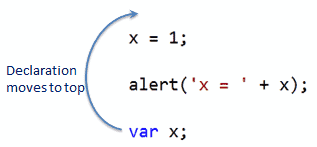25
Advanced JavaScript Series - Part 3: Weird JS behavior, Strict Mode and Hoisting

50
50In the code sample, we didn't even explicitly declare the variable but we are able to use without any error and it is available in global scope
- Older versions of JS allowed us to create variables without explicitly declaring them using the
var,letor theconstkeyword. - There are a lot of downfalls to this, some of them being-
- JS creates these variables in global scope by default thus anyone can access them from outside the function and change them.
- You can mistype a variable name and JS won't even give an error, instead it will create a new variable in the global scope because of this behavior.
- The "use strict" directive was new in ECMAScript version 5 indicating use of strict mode while running the code.
- It is supported by all the modern browsers and since it is only a string, even older versions that don't understand it won't throw any error.
- It prevents all the bad code practices in previous JS versions from turning into actual errors.
- If declared at the beginning of a script, it has global scope whereas if it is used inside the function then it's scope is only for that block/block scope.
Declaration example-
"use strict";
x = 3.14; // this will cause error- If you mistakenly mistype a variable, if ran in strict mode, it will throw an error instead of creating a new global variable.
- It prevents us from assigning values to non-writable properties by throwing an error. This wasn't the same in previous versions.
- Keywords reserved for future JavaScript versions can not be used as variable names in strict mode.
- Prevents us from duplicating parameter names.
- Prevents us from writing to a read-only properties.
- Prevents us from writing to a get-only property.
"use strict";
const obj = {get x() {return 0} };
obj.x = 3.14; // This will cause an error7.Prevents us from deleting an undeletable property.
"use strict";
delete Object.prototype; // This will cause an error8.Prevents us from using Octal numerical literals and Octal escape characters. Example-
"use strict";
let x = 010; // gives error
let x = "\010"; // gives error- Check this article for all the things that are not allowed in "use strict".
Note- The "use strict" directive is only recognized at the beginning of a script or a function.
- Hoisting is JavaScript's default behavior of moving all the declarations at the top of the scope before code execution.
- It could be variable declarations or function declarations or even class declarations.
 Credits-tutorialsteacher
Credits-tutorialsteacher
x = 5 // doesn't give any error because of hoisting
console.log(x)
var x // this gets hoisted to the top of the scope5console.log(hello()) // doesn't give any error because of hoisting
function hello(){ // this gets hoisted to the top of the scope
return "hello world"
}"hello world"- The
letandconstkeywords are hoisted but not initialized meaning that the block of code is aware of the variable but cannot use it until it's been declared, thus they give error.
x = 5
console.log(x)
let xReferenceError: Cannot access 'x' before initializationx = 5
console.log(x)
const xSyntaxError: Missing initializer in const declarationAll JavaScript declarations are hoisted but not for initialization. Initialization in variables using
varkeyword are partially hoisted but those usingletorconstkeyword are not hoisted at all and give error.Partial hoisting means that the JS engine before running the code line by line already knows that the variable exists and has some memory allocated (because of hoisting) but the value for it hasn't been set/ stored yet (it gets set when we actually reach that line of code) thus
undefinedis returned. This partial hoisting happens in case of variable initialization usingvarkeyword.

Credits- Sabih Rehman
console.log(x)
var x = 5 // this is initialization, not a declarationundefinedThis code does not work because initializations are not hoisted. It returns undefined because we have used var here that leads to partial hoisting as discussed above.
console.log(x)
let x = 5 // this is initialization, not a declarationUncaught ReferenceError: Cannot access 'x' before initialization"This is because variable initialization using let or const don't get hoisted.
All codes implemented using JS Fiddle
25
